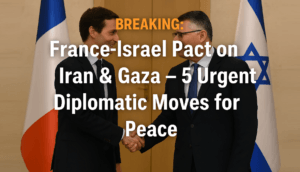BREAKING: France-Israel Pact on Iran & Gaza – 5 Urgent Diplomatic Moves for Peace
On April 3, 2025, French Foreign Minister Jean-Noël Barrot met with Israeli Foreign Minister Gideon Saar to discuss key regional issues. Both ministers reaffirmed their shared determination to prevent Iran from acquiring nuclear weapons and raised concerns about Tehran’s destabilizing activities. Barrot stressed the urgency of reaching a reliable, verifiable agreement on Iran’s nuclear program before the diplomatic window closes.
The conversation also covered the fragile situation at the Lebanese-Israeli border, with France urging full respect for the November 2024 ceasefire. Barrot highlighted France’s proposal to deploy UN peacekeepers alongside the Lebanese army to secure disputed areas and begin border demarcation talks. On Gaza, France expressed deep concern over renewed Israeli military actions causing civilian casualties and condemned attacks on aid workers. Barrot emphasized the need for a renewed ceasefire, hostage releases, and a roadmap for post-conflict stability, in line with the Arab plan.
He also announced France’s co-hosting of an international conference this summer with Saudi Arabia to push forward the two-state solution as the only path to lasting peace.

BREAKING: France-Israel Pact on Iran & Gaza – 5 Urgent Diplomatic Moves for Peace
On April 3, 2025, French Minister for Europe and Foreign Affairs, Jean-Noël Barrot, held talks with Israel’s Foreign Minister, Gideon Saar, to address pressing regional challenges. The discussions centered on Iran’s nuclear ambitions, border tensions between Lebanon and Israel, and the escalating violence in Gaza. Both ministers reaffirmed their shared commitment to preventing Iran from acquiring nuclear weapons and voiced alarm over Tehran’s aggressive actions abroad.
Iran’s Nuclear Program and Regional Threats
Barrot and Saar agreed that Iran’s pursuit of nuclear capabilities poses a grave threat to global security. They criticized Iran’s support for militant groups and its interference in neighboring countries, arguing that such actions fuel instability across the Middle East. Barrot stressed France’s push for a strict, internationally monitored deal to curb Iran’s nuclear activities. However, he warned that time is running out for diplomacy and urged Iran to engage constructively or face consequences.
Lebanon-Israel Border Tensions
The ministers also addressed ongoing clashes along the Lebanon-Israel border. Barrot called for strict adherence to the ceasefire brokered on November 27, 2024, emphasizing the need to protect civilians living near the disputed Blue Line. He reiterated France’s proposal to deploy United Nations peacekeepers alongside the Lebanese army to monitor five strategic areas still under Israeli control. These steps, he argued, would ease hostilities and create conditions for lasting calm.
Additionally, Barrot highlighted France’s interest in mediating talks to formally establish the Lebanon-Israel land border—a longstanding source of conflict. He pledged continued French support for Lebanon’s political and economic recovery, including efforts to rebuild infrastructure and strengthen national institutions.
Gaza Crisis and Calls for Ceasefire
Turning to Gaza, Barrot expressed grave concern over Israel’s renewed military operations, which have led to significant civilian casualties and widespread destruction. He condemned recent attacks on humanitarian workers delivering aid in the region, calling such acts unacceptable. France, he stated, is advocating for an immediate ceasefire, the unconditional release of all hostages held by Hamas, and the start of negotiations to outline Gaza’s postwar future. Barrot endorsed the Arab-led peace proposal, which includes plans for governance, security, and reconstruction in Gaza, as a foundation for talks.
International Conference for a Two-State Solution
Looking ahead, Barrot announced that France and Saudi Arabia will co-host an international conference in summer 2025 to revive efforts toward a two-state solution. He described this framework—ensuring Israel’s security alongside a sovereign Palestinian state—as the only viable path to lasting peace. The conference aims to rally global support for tangible steps to de-escalate tensions, rebuild Gaza, and create a political roadmap for both sides.
Conclusion
The meeting underscored France’s active role in addressing Middle Eastern conflicts while balancing solidarity with Israel and concern for Palestinian rights. Barrot’s emphasis on diplomacy, multilateral cooperation, and humanitarian aid reflects Paris’s broader strategy to stabilize the region. However, challenges remain, particularly in bridging gaps between Israel’s security demands and Palestinian aspirations for statehood. As violence persists, the international community faces growing pressure to intervene decisively and prevent further escalation.
France’s engagement signals a renewed push for dialogue, but the success of these efforts hinges on cooperation from all parties—including Israel, Lebanon, Palestinian leaders, and regional actors like Iran. With the proposed peace conference and ongoing UN initiatives, there is cautious hope that sustained diplomacy could eventually lead to breakthroughs. For now, the priority remains halting violence, protecting civilians, and laying the groundwork for a future where both Israelis and Palestinians can coexist in security and dignity.
You must be logged in to post a comment.